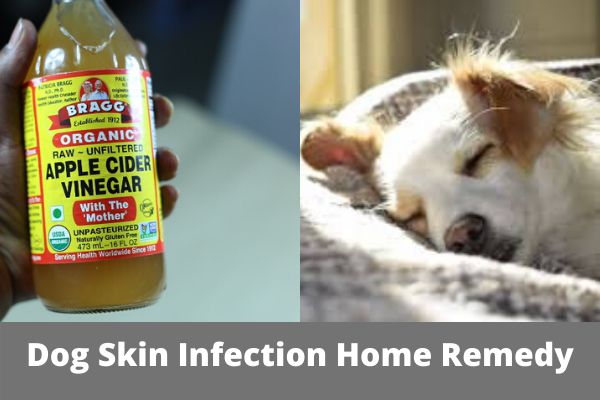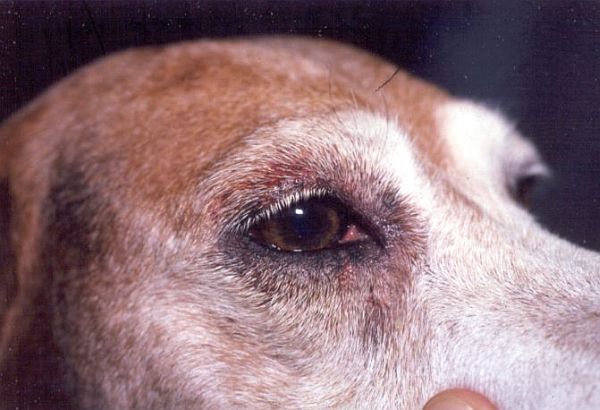Being itchy is never fun, especially for dogs, who lack the ability to explain the problem. This often leads to owners taking their pets to a veterinarian for answers.
According to PetMd, itchy skin makes up 40% of patient complaints at vet offices. The majority of the time, the diagnosis is a mild skin condition that could have been treated at home.
If your dog does a lot of scratching, see if you can determine the cause before making a doctor’s appointment. It might be a condition you can treat yourself. Keep reading if you want to treat your dog skin infection using home remedies.
Treating Your dog Skin Infection Using Home Remedies

If your dog has a minor rash or skin condition, try treating it yourself before rushing him to the vet. It’s often something simple that can be easily fixed.
For example, if you notice your pet has a lot of dry skin, this is something you can treat at home. Some vets recommend Vitamin E oil, which can help soften the fur and skin of your dog. It can also be used on dry spots, calluses, and warts. And if your pup happens to lick the oil off, it won’t harm him.
Dry skin can make you itchy. One of the quickest ways to reduce itching is using herbal astringents, like witch hazel extract. If you’re applying treatment to a larger area, look for an astringent with ethanol or vegetable glycerin rather than isopropyl alcohol. This is better in case your dog ingests any.
Another natural home remedy you can try is to cover the itchy areas with oatmeal. Make sure it’s a soupy consistency before applying. And allow it to remain on your pup as long as they will allow before rinsing or brushing it out.
A helpful tip: an oatmeal bath is great when you’re itchy too! Just add some to your bathwater and hop in.
Apple cider vinegar could be considered a multi-purpose natural remedy. ACV is great to use for irritated skin conditions, from dry, itchy skin to hot spots. Simply put some in a spray bottle and wet the areas down. And there’s no concern if your pooch licks it off.

Another use of apple cider vinegar is to give it to your dogs orally to help their digestive tract or to help treat bladder stones and to prevent urinary tract infections. Just add a teaspoon into their water bowl or feed your dog a small bowl of yogurt with a bit mixed in. And that’s not all. Apple cider vinegar can also help prevent yeast infections.
Use herbal teas to relieve your dog’s skin infection
It has become quite common to see people drinking herbal teas for different health benefits. But not many know you can use herbal tea for your dog’s itchiness.
Steep a large tea ball full of your preferred herb in a quart of almost boiling water and let it cool. Once it’s ready, simply pour it over the affected areas. If you don’t like to use loose herbs, the prepackaged tea bags work just as well when steeped in warm water.
Peppermint, lavender, and rosemary all have soothing properties. Using these herbs for your pet’s skin problems has multiple benefits. They’ll stop itching, they’ll be calmer, and they’ll smell good!
If your pet has red spots along with itching, try rinses using chamomile, plantain, or calendula. These herbs speed up healing as well as kill any bacteria on the skin. Just soak the pet and let it dry. No need to rinse. This can be done daily if needed.
If you don’t want to mix your own herbs, you can use an herbal balm such as this one. This product is made of a variety of herbs and can be used to treat eczema, hot spots, itchy skin, allergies and more. This product, from the same company, is a great first aid balm for your fur baby, in case they get cuts or scratches. And it can also be used for troublesome skin conditions.

Sores, scabs or scratches need stronger herbs
If you notice that your dog’s persistent scratching has caused sores on the skin, use a combination of these herbs, of equal portions: calendula, comfrey, sage, bee balm, thyme, and yarrow tea. This mixture speeds up the healing and keeps bacteria out during the process.
For severe conditions, like red, flaky skin and constant chewing, try a combination like juniper, calendula flowers and peppermint leaf, steeped in warm water for 10 minutes. If your pet insists on licking the treatment off, you can use cloth bandages, soaked in the mixture, and applied to the affected areas.
If you notice the skin swelling, discharging pus, and/or being feverish to the touch, it’s time to visit a veterinarian, as these are signs of infection and might require antibiotics.
Causes of itchy skin

Treating your pet’s symptoms is important but if you don’t figure out what’s causing the itchy skin, or pruritus, then you could run the risk of your dog’s skin problems getting worse. Pruritus can cause sores or skin lesions, which can get infected. It might also lead to patches of missing fur. Hair loss is actually quite common in the majority of dogs with itchy skin. These naked spots could be caused by a variety of things.
If your pet is losing hair, it’s best to get an expert opinion on the cause. Like humans, dogs can also have allergies. For instance, my pitbull is allergic to certain strains of grass. It makes his feet swell up and itch. He’ll chew them bloody. So we always have to be careful when we take him places to make sure he doesn’t have an allergic reaction. Dogs can also be allergic to fleas or a product in their food. It often requires rounds of testing to determine the allergy.
Another possibility is that your dog has hot spots or dermatitis. These spots spread quickly so it’s important to cure them as fast as possible. Hot spots appear as red, sticky sores and are caused by mites, fleas, and bacterial infections. You can treat these using home remedies but if it’s spreading too fast and doesn’t seem to be improving, consult a professional.
Yeast infections
Yeast infections could be another cause. This common condition could occur on the skin, in the ears, or on the paws. Yeast infections often put off a smell, so if you notice your pup’s itchy skin also having an odor, it might be infected. Swelling and fever are also signs. If your pet is constantly licking a certain spot, examine it closely. It might be more serious than you thought.
The treatment will vary, depending on the type of yeast infection and the location. For more severe yeast infections in the skin or on the paws, vets often prescribe oral antifungal medications. For mild cases, home remedies should be able to do the trick. Once it becomes more advanced, you might have to use prescription-strength drugs. This is more costly, so try to address the condition early on. The faster you treat it, the easier it should be to get rid of.

Kassidy Shepperd is the editor in chief for Canine-Prime.com. She is is a dog lover/trainer, a freelance writer and a volunteer at many pet rescue and shelter centers. Kassidy is based in Colorado and regularly writes for dog related magazines and blogs.


